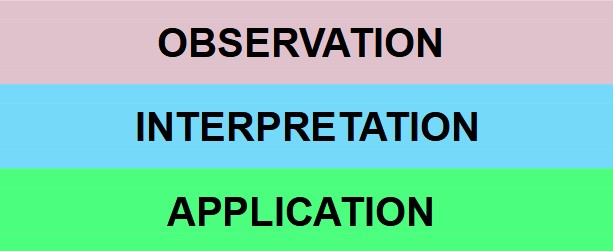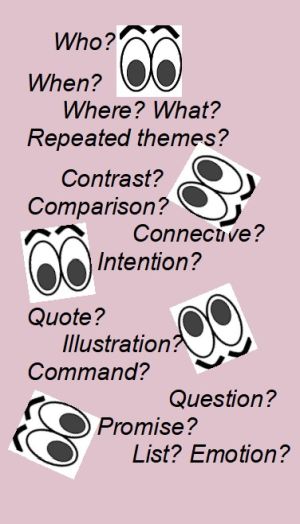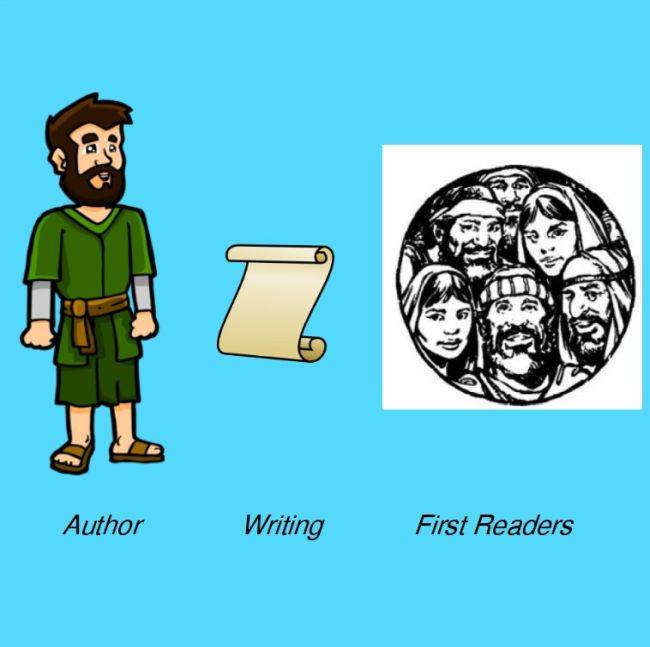3 Steps of Inductive Bible Study
The three steps of Inductive Bible Study are the following:
- 1 Observation What does the text say? What is found in this text?
- 2 Interpretation What does the text mean to those who first received it? What is the author’s goal?
- 3 Application What does the text mean for me now? What should I do in response to it?

Step 1 Observation
- This is the very essential first step of Inductive Bible Study
- To observe the text means to very carefully look at the text, to notice all kinds of details, to become aware of what the text contains.
- In order to observe better we will color the text for different themes. Coloring is a great way to sharpen our observation. Look, look, look until looking becomes seeing.

- We will ask and color for many different observation questions:
- Who? – who is mentioned? Are there any names, groups, churches, tribes or peoples mentioned?
- Where? – Are there any places, locations, cities, areas or countries mentioned?
- When? – Are there any words that express a time?
- What? – Are there any important concepts? Any repeated words of themes?
- Contrast? – Is the author making a contrast between two things?
- Comparison? – Is the author making a comparison between two things?
- Connective? – Is the author showing a causal link between two things?
- Condition? – Is the author making any if > then statements?
- Emotion? – Is there emotion expressed in the text?
- Emphatic statements? – are there any strong words or emphases in the text?
- Questions? – Is the author asking any questions in the text?
- Quotations? – Is the author quoting anything?
- Commands? – Is the author commanding anything?
- Promises? – Is the author promising anything?
- Prediction? – Is the author making any future statements?
- Lists? – Are there any lists in the text?
- Progression? – Is there a progression found in the text?
- Illustration? – Is the author using an illustration?
- Figures of speech? – Is the author using any metaphorical language?
- Look, look, look! Notice! Pay attention! Color!
- Observation is going into the details. Observation is hard work.
- If you observe carefully and diligently, it will be far easier to interpret and apply correctly – and powerfully.
- The self-discovery unit “Philemon 01 – Observation” will lead you step by step through Philemon and show you practically and with many examples how observation is done.
- At the end of that unit a full list of observation questions will be given.
Step 2 Interpretation
- Interpretation is the 2nd step of Inductive Bible Study. It is the most difficult step but it is crucial to really understanding the text.
- Often when we read the Bible devotionally we read the text (some observation), leave out interpretation and go straight to application (what does this mean for me today?).
- Interpretation is therefore the step we least do and find hardest.
- We often understand “interpretation” to mean “explaining the text’. But in Inductive Bible Study the word “interpretation” is used in a more clearly defined way:
- Interpretation means to ask yourself: What did this text meant to those for whom it was first written (we will call them ‘first readers’)? What was the author’s intention for them?
- To interpret means to go back in history and understand the situation back then, that gave rise to this text. In order to understand that we will need to answer many questions:
- Who is the author of this text? What do we know about him? How did the author and readers meet? What is their relationship? What have they experienced with each other so far?
- Who are the first readers? What do we know about them? If it is church that is being written to: How was the church founded? Through whom? How long back?
- What is the historical situation of the readers? What are their problems? Needs? Challenges? What political, economical and spiritual situation do they find themselves in?
- What situation brought about the writing of this book? What happened? What is the author’s intention for the readers? What does he want them to know? Understand? Believe? Respond to? Follow? Do? Not do?

- When reading the New Testament it is good to remind ourselves that we are reading a 2000 year old document.
- An illustration: Let’s say your great-grandparents died and the family has gathered to look dissolve their household. While cleaning up you find an ancient chest with some old papers in it. Are these old certificates? Land deeds? Photos? Drawings? Love letters? You would be looking for any date or name or face you know.
- Reading an old document like the books of the New Testament is a bit like that.
- In order to understand the writing properly, I need to look for historical context of the writing and try to understand what information I find it in.
- In order to learn how to reconstruct the historical background of a New Testament writing, please see the following unit “Philemon 02 – Reconstructing the historical background” on the same website, where the process will be done in detail for Paul’s letter to Philemon.
- On this website under the orange title “Old & New Testament – Background Information for Bible books” you will find helpful information on the historical background and the main themes for each book of the Bible. The material is arranged in four levels of detail and depth:
- 1 Main thought of the book “3 Second Summary”
- 2 Some themes and some historical background “3 Minute Summary”
- 3 Main themes and detailed background “30 Minute Summary”
- 4 In-depth study and detailed background “Detailed Study”
Step 3 Application
- Application is the most important step and the real goal of Inductive Bible study.
- Application means to think about what the writing means to me personally today.
- If we do only Observation and Interpretation, we will become smart Bible scholars, but our hearts will remain untouched and our lives unchanged. It is for this goal of applying the Word of God that we do Bible study!
- In Interpretation we saw, that the books of the Bible were written by specific authors addressing specific readers, in a given time and historic situation.
- The author indeed wrote to a specific situation, but also wrote by the guidance of the Holy Spirit. When he addresses his readers, he brings God’s perspective to their situation, God’s answer for their needs. The writings of the Bible are at the same time specifically bound to a historic situation, yet at the same moment they are the eternal Word of God. Even though Paul or Peter definitely did not have our modern day societies in mind when they were writing, yet their writing is God’s Word, truth, view and input for us humans.
- So even though we cannot fully explain how God does this, it in in His specific word to specific people that his eternal and universal Word is found that speaks to all people of all ages.



- Application is the most important step and the real goal of Inductive Bible study.
- Application means to think about what the writing means to me personally today.
- If we do only Observation and Interpretation, we will become smart Bible scholars, but our hearts will remain untouched and our lives unchanged. It is for this goal of applying the Word of God that we do Bible study!
- In Interpretation we saw, that the books of the Bible were written by specific authors addressing specific readers, in a given time and historic situation.
- The author indeed wrote to a specific situation, but also wrote by the guidance of the Holy Spirit. When he addresses his readers, he brings God’s perspective to their situation, God’s answer for their needs. The writings of the Bible are at the same time specifically bound to a historic situation, yet at the same moment they are the eternal Word of God. Even though Paul or Peter definitely did not have a modern day Bangladesh in mind when they were writing, yet their writing is God’s Word, truth, view and input for us humans.
- So even though we cannot fully explain how God does this, it in in His specific word to specific people that his eternal and universal Word is found that speaks to all people of all ages.
- How do I apply? Think about the following questions and act on what the Holy Spirit is showing you:
- What can I learn from this text?
- What understanding can I draw from this text?
- What should I believe? What should I accept? Respond to? Obey?
- In application, the more honest you are, the more you invite the Holy Spirit to speak to your conscience, the more you respond in obedience, the more it will impact and change you.
- Application needs to be personal. For example: if reading a text I think “He should really hear this!”, then that may not be a wrong thought, but it will not help me, for I do not feel challenged and am not changed.
- Application needs to be specific. For example: if reading a text I agree “Yes, forgiveness is important” then I am, of course, right, but that changes nothing. Only if I become aware about a person I need to forgive and do so, of if I go today to another person to ask for forgiveness, only if I change my behavior towards that person, application truly happens.
- Application needs to be possible. For example: if reading a text I decide “I will not get angry at my children anymore!” then that is a laudable intention, but I will not actually be able to do as I am intending to do. It would be better to admit my anger, to think what triggers my anger or to ask my children for forgiveness for a specific incident. Maybe to establish certain boundaries with my children, change a certain situation, take steps to prevent certain things from happening etc.
- We can get valuable application by putting ourselves on the author’s side and learn from him (‘How does Paul encourage people?’, ‘How does Peter show good leadership in this situation?’ ‘How does John challenge his readers on this difficult issue?’).
- We can also get valuable application by putting ourselves on the readers’ side and learn from them (‘How am I like the Galatians and what is Paul tell me to do?’)
- Praying and praying through a verse is a way of doing application.
- Meditating on a verse and letting God speak to me is a way of doing application.
- If we are honest, humble, open and willing to let our hearts be challenged and our behavior changed, God promises us that he will bring about change in us by his Holy Spirit.
- Detailed examples of how to practically do application of a bible text is shown in the self-discovery units “Philemon 03 – Interpreting and applying the main themes” and “Philemon 04 – Interpeting and applying the wider context“.